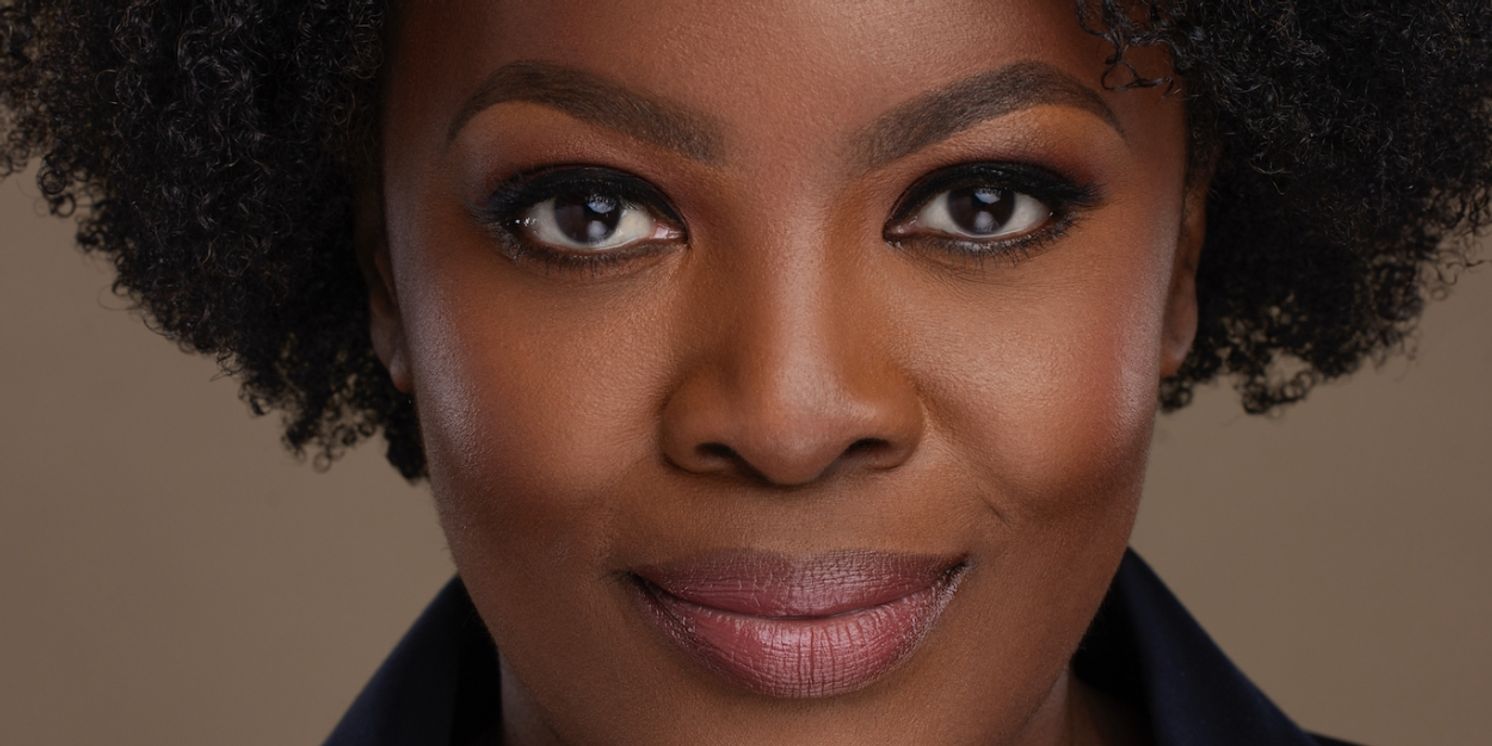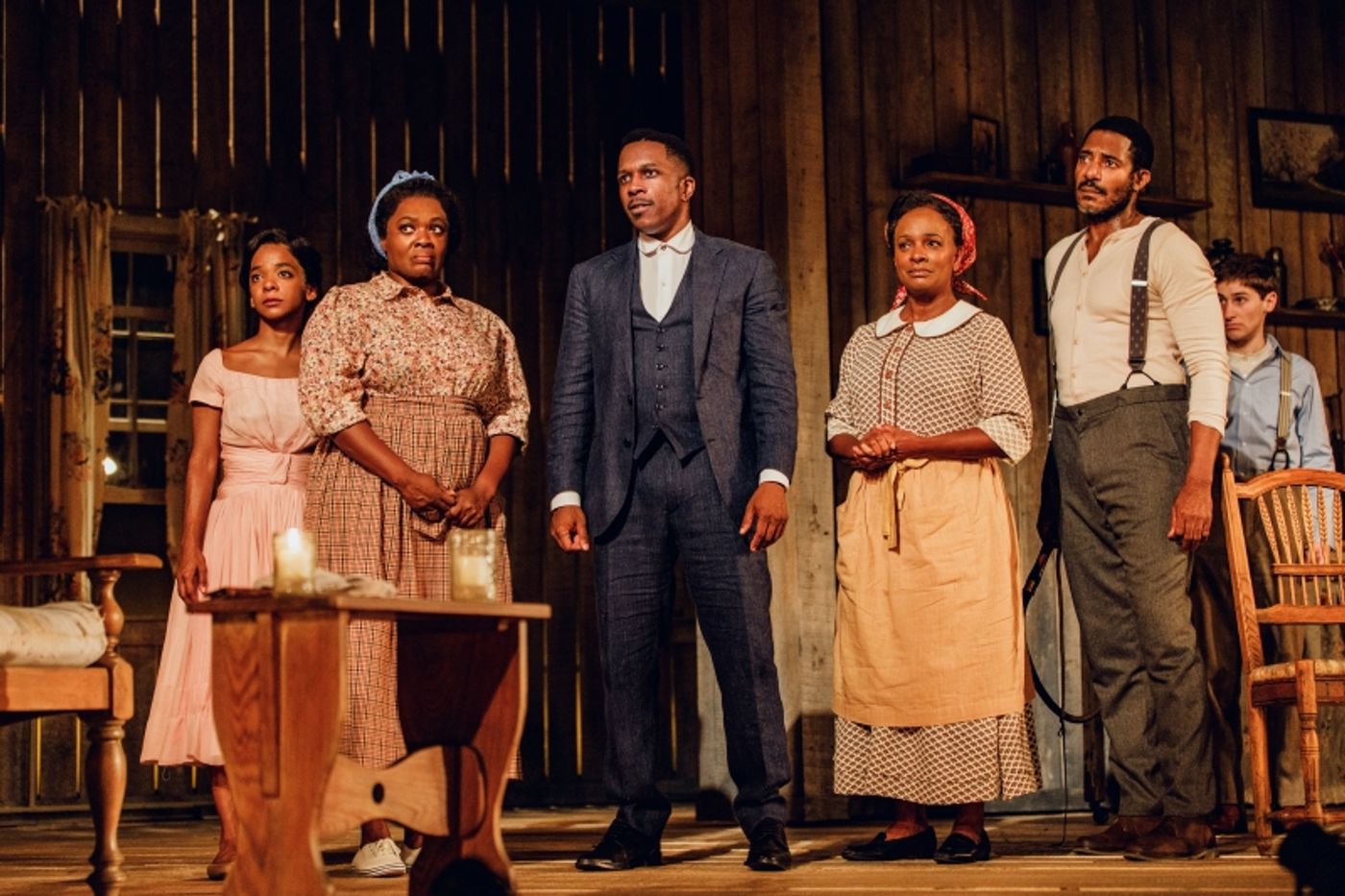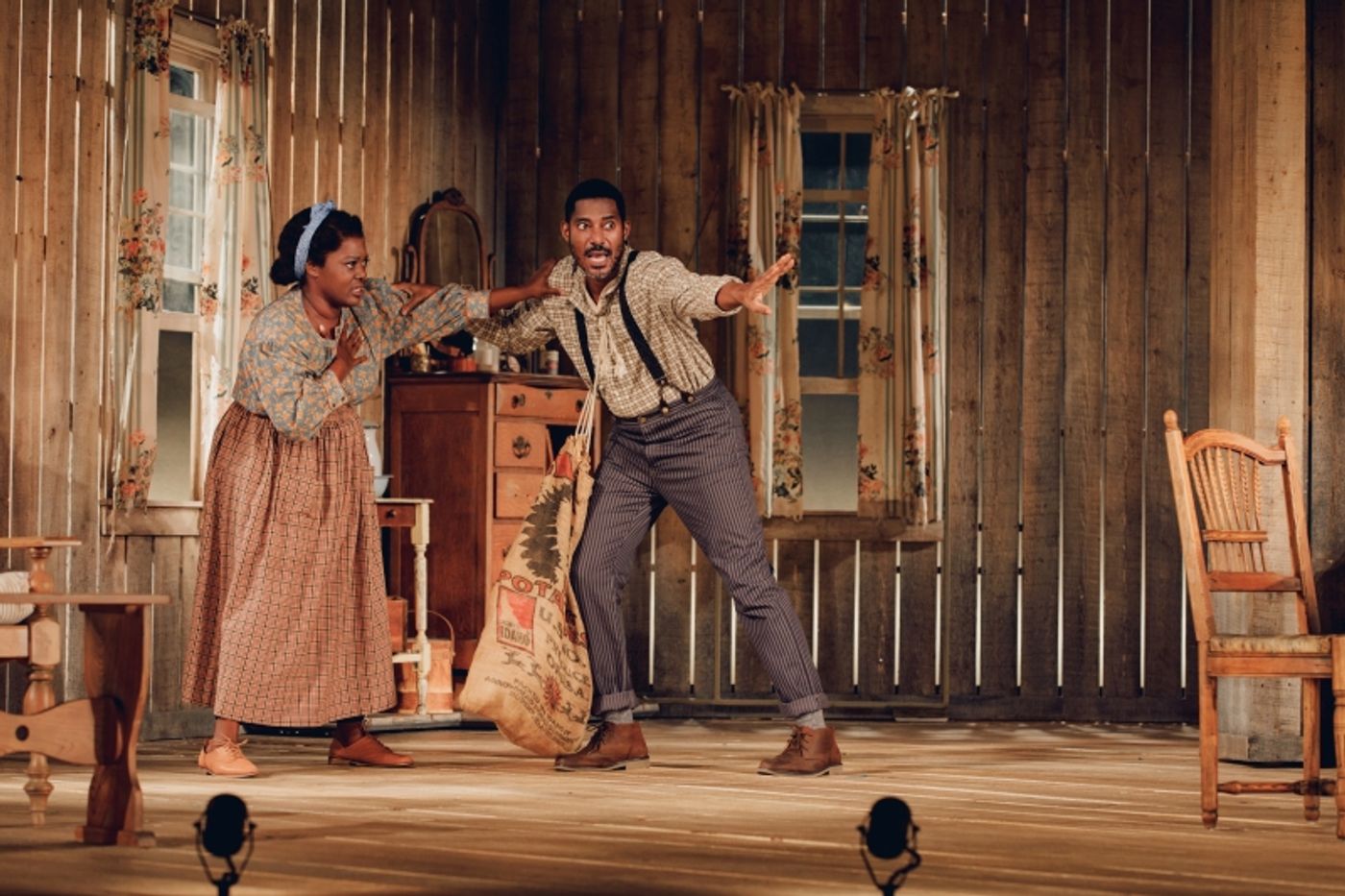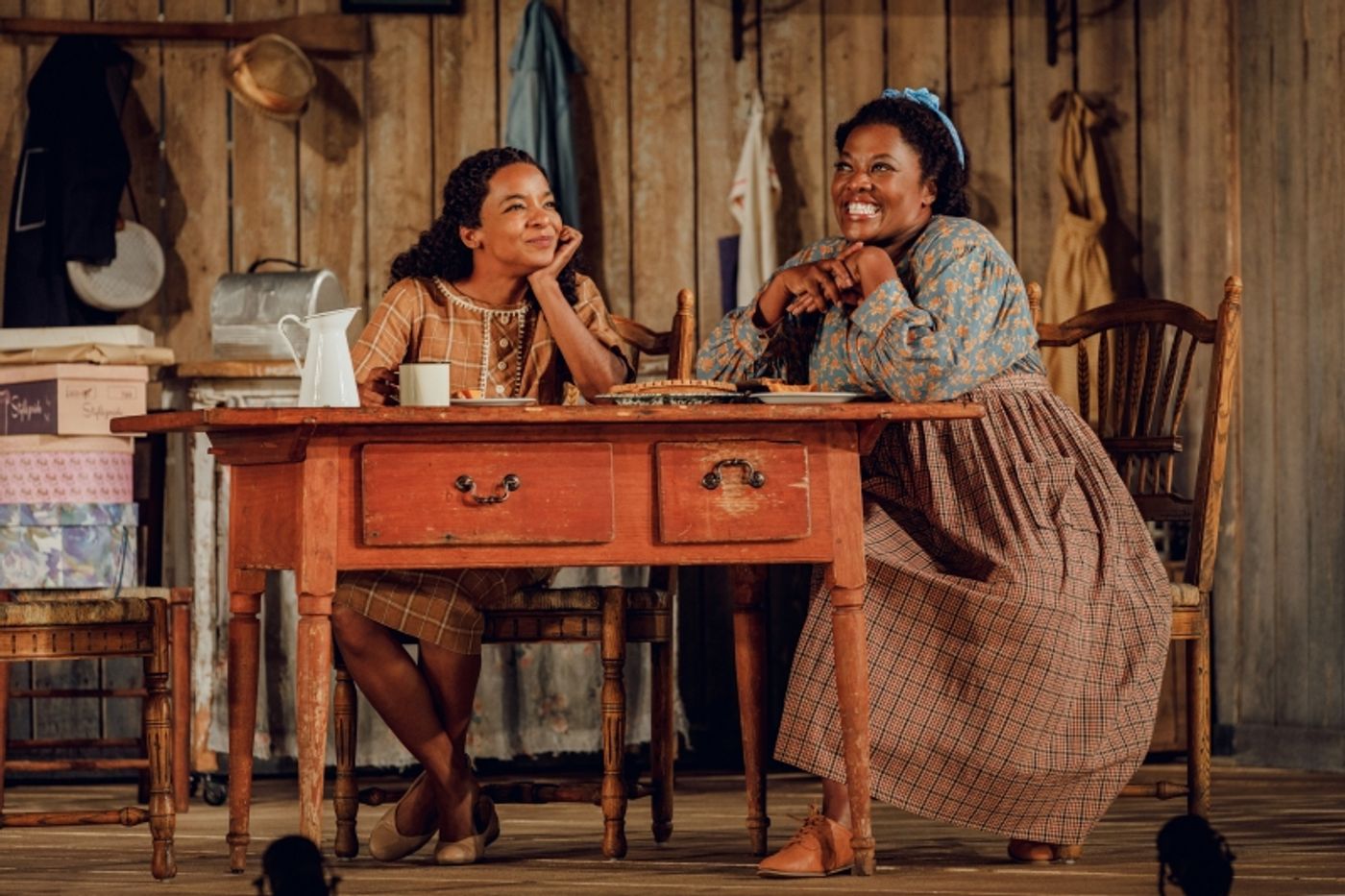Interview: Heather Alicia Simms Talks the 'Enormous' Legacy of PURLIE VICTORIOUS And More As the Play Hits 100 Performances on Broadway
Kenny Leon's acclaimed first-ever Broadway revival of Ossie Davis's play Purlie Victorious plays its 100th performance today!

The acclaimed Broadway revival of Ossie Davis's play Purlie Victorious will play its 100th performance today, December 22, 2023.
Joining stars Leslie Odom, Jr. and Kara Young is veteran actor Heather Alicia Simms, who plays the role of Missy Judson, Purlie's sister-in-law and the matriarch of the Judson family that is holding the family and all of their ambitions together.
As the show approaches this important milestone, we had the opportunity to chat with Ms. Simms about the play's continued relevance, the immense support it is receiving from the theatre community, the why the themes and storytelling of Purlie provide an illuminating and communal experience for a diverse audience.

How has the run been so far? What is your reaction to the tremendous response to this production?
Oh my gosh. It's been amazing for me. I am so happy to be a part of a company that is so well tuned, and we really enjoy each other. We really enjoy playing on stage. And the audience feedback each night is a joy to behold. We come outside after each performance to sign autographs, and they're so appreciative. When we have talkbacks, our talkbacks want to go on forever. So we know that we are engaging the audience in a very powerful way.
What initially drew you to the role of Missy?
Jeffrey Richards asked me to come and do a workshop reading of the play. The thing that I love so much about Missy is her heart. She is the anchor of this piece, and she wants to continue the legacy. She wants to continue her family. She, when she greets the Lutiebelle, she's like, I always wanted me a daughter just like you. And so she sees a future in her. So, her warmth, her need for family, those are the characteristics that really drew me to Missy.
This is such an incredible company under the direction of the great Kenny Leon. What was the rehearsal process like to create the very well-oiled machine we see on stage?
You know, what's wonderful about this company is that I think that we are all on a certain level leaders, right? But we are leaders that know how to follow, and so we can come with our own special gifts. We can come with our own way of playing and we will play with each other. What Kenny allowed us to do was to sit in a room and play. When our play got out of the scope of what he wanted us to do, he would pull us back or reign us in, or move our instinct more toward what his vision for the play was. It was just amazing to have the kind of conversations that we had, even when we sometimes had differing ideas about a moment should be, we really sat in it and tried to figure it out. What could this be? What is the heart of it? And I don't think that anyone felt like they couldn't say anything. So that was really special...I think that in someone else's hands, perhaps this play would not have resonated in the same way. But what Kenny kept imploring us to do was to really get to the heart of these people and the truth of the people, and not try and play the comedy of it. And I think that he was able to shape this world and champion this world in a way that made us feel like we need to convey the love that we have for these people in the most loving way.

And the play is written and performed in a way that is so beautifully balanced between very clearly conveying a message about race and racism, but doing so in a way that isn't didactic and is ultimately unifying and genuinely entertaining.
I think that's one of the things I love most about the play is that there is the comedy, but he really exposed the heart of these people, but the hearts of these people are the heart of our country, right? And so what he was able to do was to shine a light on the things that we have been grappling with as a nation for so, so long and say, okay, you know what? Some of this is hilarious and some of this is painful, and we're gonna have to live in those places, you know, at different points. And how are we gonna deal with it? And what you as a white person may find funny me as a Black person may not, and vice versa. And then that's where the conversation happens because it's like, wait, what did you find so funny about that moment? Oh, okay. And so it creates conversation. And I've had some of those conversations outside with some of the audience members. So it's been wonderful...It's a challenging play, and it's challenging in ways that will sneak up on you, as you say...He was challenging his audience to look at themselves, to laugh at themselves, to interrogate themselves in a way that may or may not have been comfortable, but he also allowed us to laugh. So I think that is the great power that he exerted with his pen.
Having now done this role for one hundred performances, how has your relationship to the material evolved? How has your relationship to Missy evolved? How do you keep things fresh?
As a part of how I work, I'm not one of those people who feels like I've perfected the thing, and so I can just sit in it. I'm always working, and so I think that's a part of keeping it fresh. Another large part of keeping it fresh are the audiences. The audiences are going to be different every single night, and so you never know what you're going to run into. You never know if they're going to laugh on the line that they've been laughing on for the last five shows. So it's this feeling of just riding with the company and locking in with them, but also having somewhat of a feel for the audience. Now we feel so comfortable that we can try certain different things. Leslie and I have a moment on stage where we do a little dance, and from night to night, I don't know if he's gonna lift me in the air or if he's gonna dance around or spin me around. And then he leads, I follow, and it's just a great time.
What does it mean to you to be part of this company that gets to bring such an important but underappreciated play back to Broadway?
You know, it feels large to me. It feels enormous. It feels historic because to have a play like this that has been not lost, but overlooked, on a certain level and bring it back and have fresh eyes and fresh ears and a fresh perspective on it, it feels like a triumph because people are seeing Ossie's work. I think people knew Ossie as an actor and an activist, but people don't know him as the amazing writer that he was. And so I feel like I'm putting my stamp on a part of history, and it feels like the challenge that I been looking for for a long time. It's a lesson. I think it's a huge history lesson. As an undergrad, I didn't major in theatre. I majored in history and English. And so, with my history background, I understand that the past is often prologue. And if we forget our past and we think that the things that are happening now are brand new, all it really means is that we haven't solved those problems. We haven't dealt with the issues. And so many of the things that Ossie wrote in this play are pointing us to the fact that these are issues that we still have not tackled. We have not come to any real movement on some of these issues. Ossie was able to pepper this play with these moments that are still relevant. And so it makes me go, come on America. We've gotta wake up and look and see and figure out how are we going to deal.

At this point, your Broadway resume includes works by August Wilson and Lorraine Hansberry, and now Ossie Davis. Having had those experiences, have you found that they've informed the way that you come to a play like Purlie?
When I worked on Ma Rainey's Black Bottom, August [Wilson] was still alive, you know? August was there at rehearsals. And I've always been about the words...but having August in the room, August knew every word to every one of his plays, and I would sit in the audience when I wasn't on stage, and I would watch him kind of mouth his words, and it made me go, I have got to love these words and attempt to be as spot on as word perfect as I can be. Because he poured love into these words. So I know Lorraine poured her love in her heart into these words, August poured love in his heart into the words. So I have to attempt to do the same. That's what I know for myself of working on these works. They lasted this long because it is about the text. It is about the words. It's about the work. And so, I honor that.
Heather Alicia Simms is a multifaceted talent, renowned for her compelling performances on stage, screen, and in voiceover. Born and raised in Brooklyn, New York, she is a trailblazer, being the first in her Jamaican family to be born in the United States. Her journey through the public school system ignited her passion for the arts, leading to a dynamic career spanning theater, film, and television.
Heather's theatrical prowess has graced both Broadway and acclaimed off-Broadway productions. Notably, she captivated audiences in Theater for a New Audience's "Des Moines" and Soho Rep's Pulitzer Prize-winning production, "Fairview," earning accolades for her role. Under Lynn Nottage's residency at The Signature Theatre, Heather delivered powerful performances in "Fabulation" and "By The Way, Meet Vera Stark," winning a prestigious 2019 Obie Award.
Broadway has witnessed her talent in productions such as "Ma Rainey’s Black Bottom," "A Raisin in the Sun," "Gem of the Ocean," and currently in “Purlie Victorious” showcasing her versatility and depth as an actress. Off the Broadway stage, Heather's repertoire includes the world premiere of "Barbecue" at The Public Theater, "Born Bad" at Soho Rep, and "Richard III" at NYSF, among others.
Heather's television credits feature a diverse range of roles, from the compelling Yvette King in "The Kings Of Napa" to appearances in "Marvel’s Luke Cage," "Blue Bloods," "The Last O.G.," and more. Her film career boasts notable contributions to "Vampires vs. The Bronx," "Red Hook Summer," "The Nanny Diaries," and "Broken Flowers."
Beyond her artistic achievements, Heather is an active voiceover artist, lending her voice to commercials and audiobooks. Her dedication to continuous learning led her to pursue an MFA at Columbia University, following her undergraduate studies at Tufts University, where she co-founded the Tufts Black Theater Company.
Heather's cultural roots in Jamaica and her upbringing in Brooklyn shape her identity. Family holds a special place in her heart, and she cherishes gatherings, especially since the passing of her parents. As a proud member of the Brooklyn Alumnae Chapter of Delta Sigma Theta Sorority, Inc., she continues to contribute to her community.
Outside the spotlight, Heather embraces various hobbies, from nurturing her plant collection to exploring her culinary skills, particularly during the festive Christmas season. Her love for travel took her to Ghana, and she aspires to explore Asia and Africa further. As she looks forward to the future, Heather contemplates learning new skills, with sewing and woodworking topping her list of potential endeavors. In every aspect of her life, Heather Alicia Simms embodies a spirit of creativity, curiosity, and commitment to making a meaningful impact in the world.
Photo Credit:
Production Photos: Marc J. Franklin
Headshot: Sophia Elizabeth
Powered by
|
Videos

